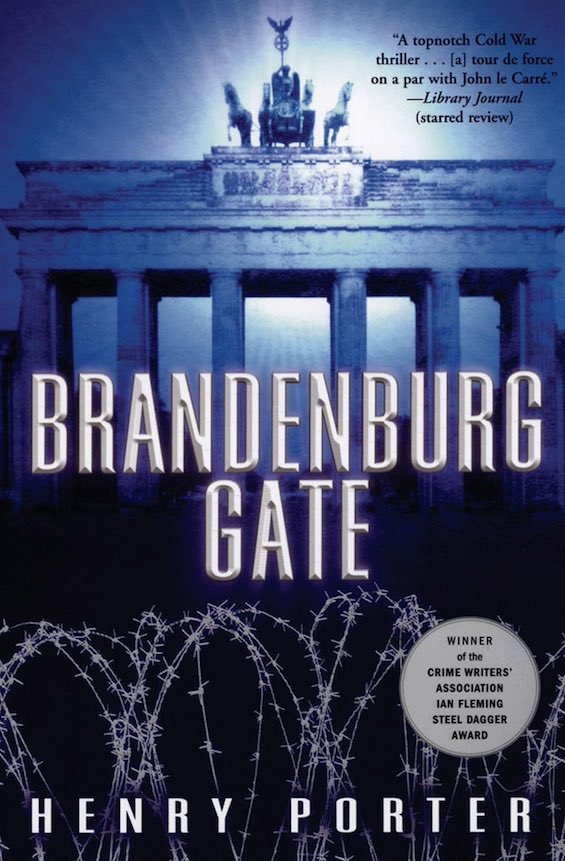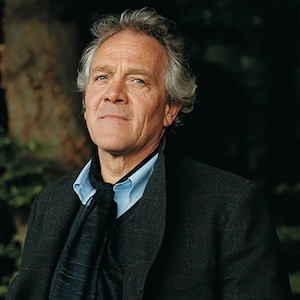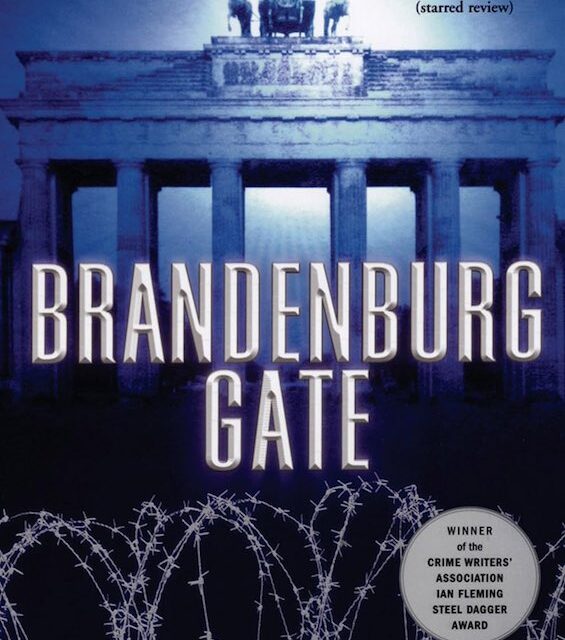
Estimated reading time: 5 minutes
On November 9, 1989, the Berlin Wall fell, setting off a fast march to German reunification. But it was not a singular event, arising out of the blue. Because the reform movement launched by Mikhail Gorbachev in Moscow four years earlier had triggered a series of increasingly assertive protest movements throughout Communist-run Eastern Europe. And for many months in 1989, East Germans, tens of thousands at a time, had taken to the streets. With fury and self-confidence rising, they denounced the ruling Socialist Unity Party and its enforcement arm, the Ministerium für Staatsicherheit, or Ministry of State Security, known as the Stasi. And Henry Porter’s epic novel of espionage, Brandenburg Gate, plays out in the shadow of these momentous events before the Wall fell.
A convoluted operation engaging six spy services
It’s September 1989. Dr. Rudi Rosenharte is a world-class art historian and a former foreign agent for the Stasi. The last thing he wants in his academically circumscribed life is to risk everything across the border—but that’s precisely what the Stasi now insists he do. They are forcing him to travel to Trieste to rendezvous with his former lover, Annalise Schering, then a secretary at NATO headquarters in Brussels. And to ensure that he follows through, they’ve imprisoned his twin brother and his wife and placed their children under the care of the state.
Rudi has no choice. His brother is ill and urgently needs care. He must do as they say. But there’s a catch. Annalise Schering is dead. He knows it because he saw her lying in a bathtub in bloody water on his last assignment. For some reason, though, he kept her death secret from the Stasi.
Clueless how he’ll win his brother’s release, he arrives in Trieste involved in a complex espionage operation mounted jointly by MI6 and the CIA. And when two months later the action reaches its climax, three other intelligence agencies will be have been involved as well in addition to the Stasi. West Germany’s BND. Poland’s SB. And the KGB. Somehow, frequently risking his life, Rudi must maneuver through this thicket of clashing agendas. And in the process he will learn long-hidden truths about his life.
Brandenburg Gate by Henry Porter (2007) 448 pages ★★★★★

Even totalitarian power has its limit
Porter does a stellar job portraying the mounting turmoil within the Stasi during its final two months in power. He takes us behind the scenes of what at the time was known as one of the world’s most effective intelligence agencies. With 80,000 employees and one in every seven East Germans as informants, the Stasi was the tail that wagged the government’s dog. But even this seemingly absolute power wasn’t enough to resist the fast-growing anger of the East German people as they saw the reins loosening elsewhere in Eastern Europe and the Soviet Union. And in the end, when half a million people gathered to protest in Berlin on November 9, 1989, the government fell with the Wall. Will Rudi Rosenharte live to see that day? Read the book.
About the author

Henry Porter is an English journalist, author, and political activist. For long periods, he was the editor of the British version of Vanity Fair and a columnist for The Observer newspaper. But he has also won awards for his thrillers, of which he has published eight to date. Porter was born in 1953 and was educated at the University of Manchester.
For related reading
I’ve reviewed two other superb novels about espionage operations in East Berlin:
- The Matchmaker: A Spy in Berlin by Paul Vidich (A dangerous spy game in Berlin before the fall of the Wall)
- The Berlin Exchange by Joseph Kanon (An ingenious tale about a spy swap in East Berlin)
For other good British spy novels, see:
- Charles Cumming’s first-rate spy thrillers
- Following Mick Herron’s clever British spies at Slough House
- Dame Stella Rimington’s Liz Carlyle series of top-notch espionage novels
- Top-notch spy novels from Alex Gerlis
You might also enjoy my posts:
- The 15 best espionage novels
- Good nonfiction books about espionage
- The best spy novelists writing today
- Top 10 mystery and thriller series
And you can always find my most popular reviews, and the most recent ones, on the Home Page.



























Interested in fact based espionage and ungentlemanly officers and spies? Try reading Beyond Enkription. It is an enthralling unadulterated fact based autobiographical spy thriller and a super read as long as you don’t expect John le Carré’s delicate diction, sophisticated syntax and placid plots.
What is interesting is that this book is apparently mandatory reading in some countries’ intelligence agencies’ induction programs. Why? Maybe because the book has been heralded by those who should know as “being up there with My Silent War by Kim Philby and No Other Choice by George Blake”. Maybe because Bill Fairclough (the author) deviously dissects unusual topics, for example, by using real situations relating to how much agents are kept in the dark by their spy-masters and (surprisingly) vice versa.
The action is set in 1974 about a real British accountant who worked in Coopers & Lybrand (now PwC) in London, Nassau, Miami and Port au Prince. Simultaneously he unwittingly worked for MI6. In later books (when employed by Citicorp and Barclays) he knowingly worked for not only British Intelligence but also the CIA.
It’s a must read for espionage cognoscenti but do read some of the latest news articles in TheBurlingtonFiles website before plunging into Beyond Enkription. You’ll soon be immersed in a whole new world which you won’t want to exit.
See https://theburlingtonfiles.org/news_2023_06.07.php and https://theburlingtonfiles.org/news_2022.10.31.php.